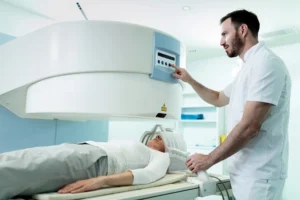Coping With Mental Health Conditions Such as Depression and Anxiety
- Updated on: Nov 18, 2024
- 4 min Read
- Published on Jan 10, 2023

Mental health is about how people feel, think, and behave. Mental health conditions refer to those conditions that affect a person’s mood, thinking, and behavior. Depression and anxiety are two of the most common mental health conditions that affect people globally.
Depression is a serious medical illness that negatively affects how a person feels, thinks, and acts. It is characterized by persistent feelings of sadness or loss of interest in certain types of activities. It can exhibit a range of symptoms such as changes in sleep, appetite, and energy levels, difficulty in concentrating, and feelings of hopelessness or helplessness.
Anxiety on the other hand is a normal emotion that everyone goes through at one point of time or the other. But anxiety can become a mental health condition requiring medical treatment when it becomes excessive and persistent to an extent that it interferes with a person’s daily life.
Anxiety is characterized by feelings of worry, nervousness, or fear. It can exhibit physical symptoms such as muscle tension, heart palpitations, and difficulty in breathing.
Prevalence of mental health conditions
Mental health conditions are incredibly common. Their prevalence of mental health conditions, in particular of, depression and anxiety is on the rise throughout the world. According to the World Health Organization, an estimated 264 million people globally suffer from depression, and more than 260 million people suffer from anxiety related disorders. It has been reported in many studies that 1 in 5 adults in the United States have experienced a mental health condition in the past year and up to 1 in 20 adults live with a serious mental illness, many even not knowing that they suffer with the illness.
Importance of addressing mental health conditions
Treatment of mental health conditions is extremely important because they can have a significant impact on a person’s overall health and well-being. Untreated or poorly treated mental health conditions can lead to other problems, such as difficulties at work or school, relationship problems, and physical health problems. Mental health conditions can affect a person’s overall quality of life and their ability to conduct day-to-day normal activities.
Individuals who are struggling with mental health conditions should receive appropriate treatment. These treatments may include therapy, medication, or a combination of both to help individuals manage their symptoms and improve their overall quality of life. Mental health education, awareness campaigns, and reducing the stigmatization around mental health helps everyone to access care and support.
Understanding depression and anxiety
Symptoms of depression
These are some common symptoms associated with depression:
- Persistent feelings of sadness or hopelessness
- Loss of interest in activities
- Difficulty sleeping or oversleeping
- Changes in appetite
The symptoms of depression can vary from person to person. Some common symptoms include persistent feelings of sadness or hopelessness, loss of interest in activities that were once enjoyed, changes in sleep patterns such as difficulty sleeping or oversleeping, and changes in appetite that leads to weight loss or gain.
Symptoms of anxiety
These are the common symptoms of anxiety:
- Persistent feelings of worry or fear
- Difficulty concentrating
- Physical symptoms such as sweating or a rapid heartbeat
- Avoiding situations that trigger anxiety
People who experience anxiety may also have difficulty concentrating and may avoid situations that trigger their anxiety attacks.
Causes of depression and anxiety
Common causes of depression and anxiety are:
Biological factors: Depression and anxiety can be caused by a combination of genetic, biochemical, and environmental factors. Imbalances in certain brain chemicals, called neurotransmitters, can contribute to depression and anxiety. Family history of mental health conditions can increase the risk of developing these conditions.
Environmental factors: Traumatic life events, such as the loss of a loved one, a job loss, or exposure to violence, can also lead to depression or anxiety. Stressful living conditions, such as poverty, or chronic illness can also contribute to the risk of depression and anxiety.
Psychological factors: Cognitive factors such as negative thinking patterns, low self-esteem, and poor coping mechanisms can also lead to depression or anxiety.
Differences and similarities between depression and anxiety
Depression and anxiety are two distinct conditions. But they have some similarities in symptoms and causes.
Both depression and anxiety can be caused by a combination of biological, environmental, and psychological factors. Both can cause changes in your mood, thinking, and behavior. However, there are some key differences between them. Depression is characterized by persistent feelings of sadness or hopelessness, while anxiety is characterized by persistent feelings of worry or fear. Depression tends to be more persistent and constant, while anxiety symptoms may come and go and do not persist for a long time continuously.
People with depression may have difficulty feeling pleasure or motivation, while people with anxiety may experience more physical symptoms such as muscle tension.
Coping strategies for depression and anxiety
Self-care
Taking care of oneself is an important aspect of managing depression and anxiety.
Exercise and physical activity: Regular exercise has been shown to be an effective way to manage symptoms of depression and anxiety in people. Exercise can improve mood, reduce stress, and increase feelings of well-being in people suffering with depression and anxiety.
Eating a healthy diet: Eating a well-balanced diet can have a positive impact on your mental health. Maintaining a healthy body weight is important, and you can use a BMI Calculator to help monitor your weight. Eating foods that are high in nutrients and low in processed sugars can improve mood and reduce feelings of anxiety and depression.
Getting enough sleep: Adequate sleep is important for overall health and well-being. It can help reduce symptoms of depression and anxiety and improve your mood.
Practicing relaxation techniques: People with conditions such as anxiety or depressive disorder may benefit from relaxation techniques. These include deep breathing, meditation, yoga, and mindfulness etc.
Psychotherapy
Talking with a trained mental health professional can be effective in managing your symptoms of depression and anxiety.
Cognitive-behavioral therapy (CBT): CBT is a type of talk therapy that focuses on identifying and changing negative thought patterns that contribute to depression and anxiety.
Interpersonal therapy: Interpersonal therapy focuses on a person’s relationships and how they contribute to the symptoms of depression or anxiety.
Mindfulness-based therapies: Mindfulness-based therapies such as mindfulness-based stress reduction (MBSR) and acceptance and commitment therapy (ACT) can be helpful. These techniques teach individuals how to focus on the present moment in a non-judgmental way and to develop coping strategies for dealing with negative thoughts and feelings.
Medication
Antidepressant and anti-anxiety medications are available and effective in managing symptoms of depression and anxiety.
Types of antidepressants and anti-anxiety medication: There are several different types of antidepressants and anti-anxiety medications available in market. Selective serotonin reuptake inhibitors (SSRIs) and serotonin-norepinephrine reuptake inhibitors (SNRIs) are the most commonly prescribed antidepressants. Benzodiazepines are the most commonly prescribed anti-anxiety medication.
Pros and cons of medication: Medication can be effective in managing symptoms of depression and anxiety, but it’s not always suitable for everyone. Medications can have side effects and may not work for everyone. They should be used with the guidance of an experienced medical professional or mental health practitioner.
Potential side effects: The potential side effects of antidepressants and anti-anxiety medications vary depending on the specific medication. They can include drowsiness, nausea, sexual side effects, and changes in appetite.












